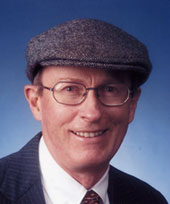
John Finney served as the Associate Dean and University Registrar for many years. He currently writes a column on Puget sound History for Arches magazine and has been a volunteer in the University Archives since fall 2007.
Tell us about your project?
The project has evolved into the digging out of some of the college’s stories. The framework for this is the scanning into digital form of some of the old photographs in the archives. Scanning photos is what I started doing fall 2007, and soon I realized that with every photo is associated an interesting story. Gradually, the writing of the stories began to assume a larger share of my time in the archives. Beginning with the spring 2008 issue, I have written a “From the Archives” column for Arches that features the story associated with one or more photographs. Writing is one way to share the stories. Another way is to make the photographs themselves available in one of the library’s contentDM collections. The archives digital image collection currently contains some 700 images that I hope can be made available on-line in the weeks or months ahead.
What do you see as the value of this project?
It is important to understand where we have been so that we can know where we are going. This is the value of an archives collection in any organization, especially a college such as ours, which follows many important traditions. Making relevant information available about where we have been can be helpful to students, faculty, and administrators in charting the future.
What are 2-3 favorite fun facts about the University?
The college owned its own ski lodge near Crystal Mountain between 1948 and 1956. We acquired the lodge cheap because we were “ahead of the curve” in terms of the growing interest in winter snow sports. “Was selling it a good idea?” is an interesting question.
The unidentified professor in the Rowena Alcorn painting hanging in the library outside and to the left of The Shelmidine Room door (Library 209) is Walter S. Davis, who began teaching at the college in 1907. It is because of Professor Davis, an historian, that the earliest history of the college is well documented and preserved. Professor Walter S. Davis looms large in the archives. He was known as Senator Davis because he served several terms as senator in the Washington State legislature.
A tradition that we still have yet have lost concerns the hatchet. The original tradition was that the senior class passed the hatchet on to the junior class by providing a menu of clues and riddles that juniors had to solve in order to find the hatchet. This went on year after year for decades. Now the hatchet disappears for years or decades at a time and when it (or a facsimile) does reappear, it is locked away until it is literally stolen and is once again gone for years at a time. Perhaps the original tradition was more exciting.
We are the Loggers, and we all know that we owe much of our institutional strength to the support of lumbermen, such as Charles Hebard Jones, Leonard Howarth, and the Weyerhaeusers. But we may not know that we also owe a large debt of gratitude to one of the most important railroad men in history, James J. Hill, builder of the Great Northern Railway, one of the predecessor lines of today’s Burlington Northern Santa Fe Railroad. It was Hill who took an interest in a small, struggling Tacoma college and pledged to give $50,000 if the college could raise $200,000 by a certain date in 1914. Meeting the “Hill Challenge” was one of the first significant achievements of President Edward Howard Todd, who began his 29-year presidency in 1913. Hill’s gift was critically important at a precarious time in the college’s development.
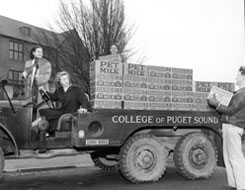
Student milk drive for European World War II relief December 1947 in front of Jones Hall
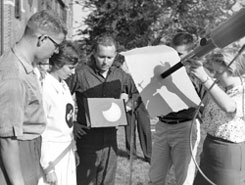
Students observing the September 20, 1960 eclipse of the sun
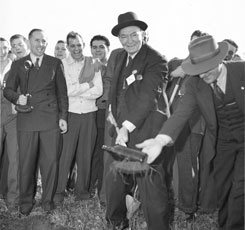
Professor Walter S. Davis wields the shovel at the February 16, 1938 Anderson Hall groundbreaking ceremony. Dean John Regester holds the microphone
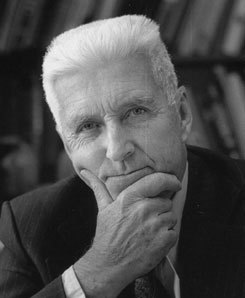
Biology Professor Gordon Alcorn, for whom the University of Puget Sound Gordon Dee Alcorn Arboretum is named, 1980
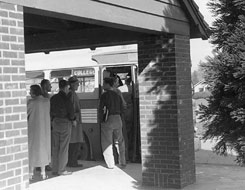
Students boarding a city bus at the campus bus shelter, 1949. The bus shelter was a 1948 gift to the college from the Northwest Tacoma Kiwanis Club. It was located on the southwest corner of Lawrence and North 15th Streets. The shelter was removed in the 1980’s when Lawrence Street was closed so that Rasmussen Rotunda could be added to the student center. The exact location of the shelter is known from the location of the giant sequoia tree in the photo, still thriving across from Wheelock today.

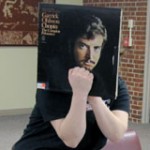
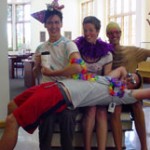
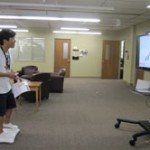
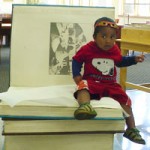
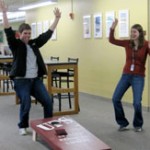
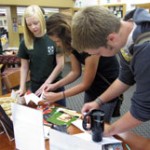
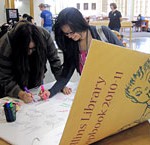
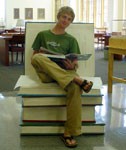
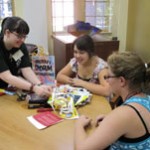
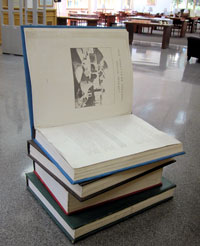
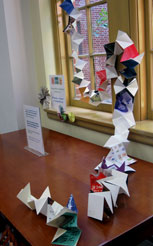 Welcome Freshman! We are glad you are here! Check out the web page we made just for you! Our
Welcome Freshman! We are glad you are here! Check out the web page we made just for you! Our 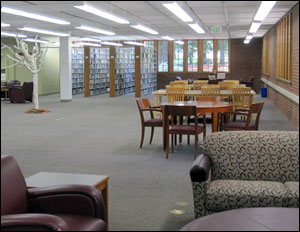 Open Space: We have plenty of light, open space now that Government Documents have been moved to the basement level of the Library. The space is wonderful and new furniture is on order.
Open Space: We have plenty of light, open space now that Government Documents have been moved to the basement level of the Library. The space is wonderful and new furniture is on order.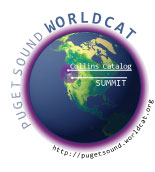 Puget Sound WorldCat: We are launching this brand new catalog, where you will be able to look for materials we own at Puget Sound, in academic libraries in Oregon and Washington as well as the World with just one search!
Puget Sound WorldCat: We are launching this brand new catalog, where you will be able to look for materials we own at Puget Sound, in academic libraries in Oregon and Washington as well as the World with just one search!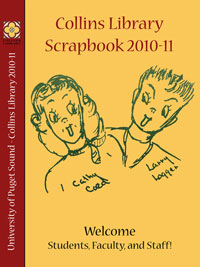 Be on the lookout for some intriguing items in the library this Fall – like the biggest Collins Library scrap book you’ve ever seen!
Be on the lookout for some intriguing items in the library this Fall – like the biggest Collins Library scrap book you’ve ever seen!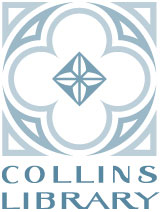 Below is the text of a letter written by one of our student assistants to seniors. We thought you might enjoy it! Be sure to check out the yearbooks in the front lobby and the many images of graduation on display in the LINK. Best of luck in the future and congratulations, once again!
Below is the text of a letter written by one of our student assistants to seniors. We thought you might enjoy it! Be sure to check out the yearbooks in the front lobby and the many images of graduation on display in the LINK. Best of luck in the future and congratulations, once again! Collins Library can help! Take a 5 minute break and browse the
Collins Library can help! Take a 5 minute break and browse the 
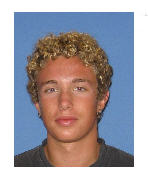 Artist Statement
Artist Statement




